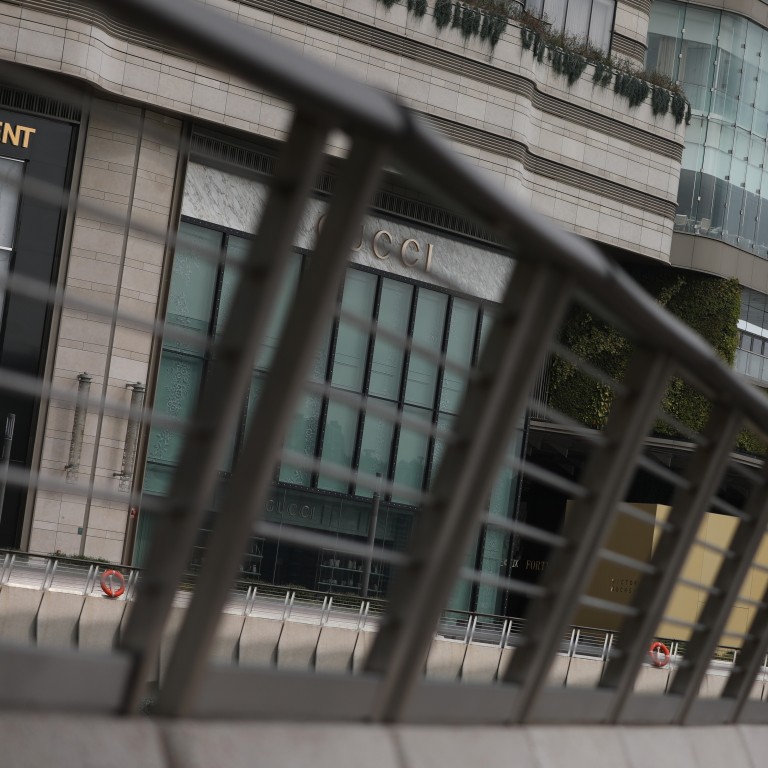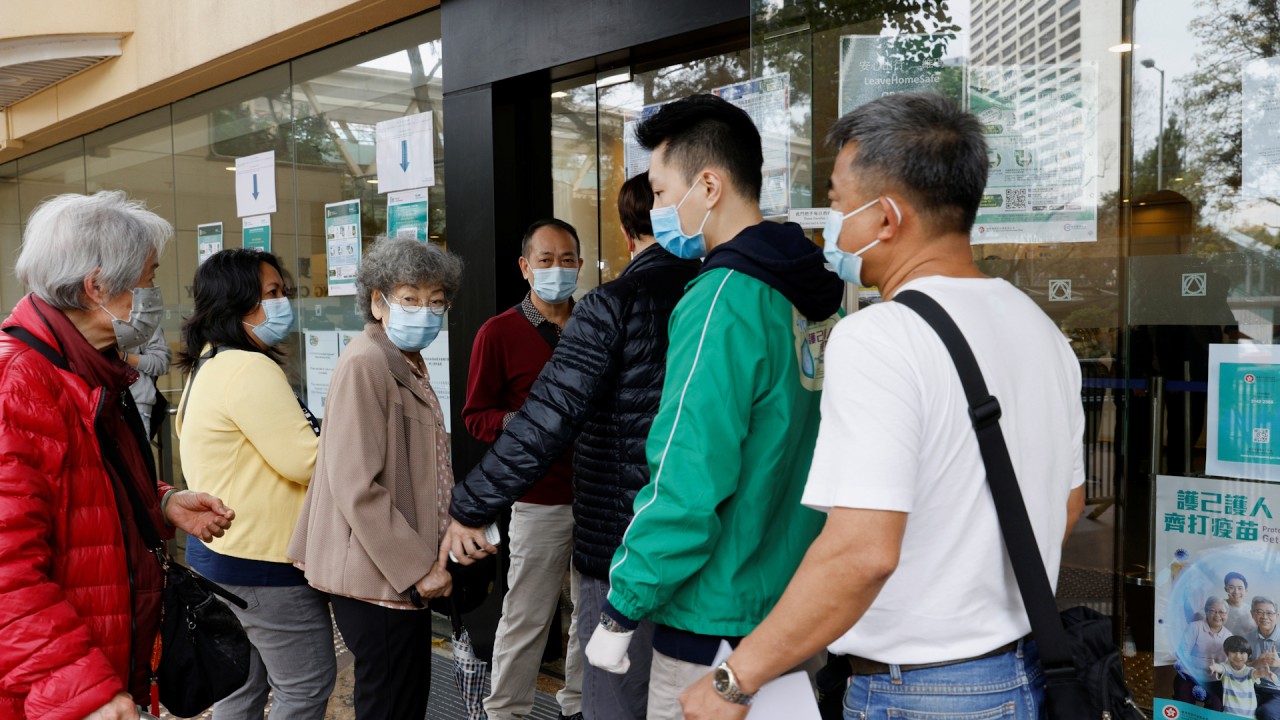
Coronavirus: bookings for delayed Pfizer-BioNTech jabs to open in Hong Kong; restaurant rules tightened as cluster grows
- Health experts say cluster indicates city’s restaurant employees should be among those given vaccination priority
- A 79-year-old male patient at Princess Margaret Hospital becomes the city’s 200th victim of the pandemic
Bookings for the long-delayed Pfizer-BioNTech coronavirus jabs would open on Wednesday, officials said on Monday, as Hong Kong health authorities racing to contain a growing restaurant cluster announced tightened guidelines for eateries.
Secretary for the Civil Service Patrick Nip Tak-kuen said that 140,000 doses of the vaccine, jointly developed by German firm BioNTech and American pharmaceutical giant Pfizer, would be available in the first phase of the roll-out.
Priority residents, including those aged 60 and above, and frontline medical workers will start receiving jabs next Wednesday.

00:56
Hong Kong begins mass vaccination programme with Covid-19 jabs developed on the Chinese mainland
But the city’s vaccination drive has been complicated by the cluster of infections at Mr Ming’s Chinese Dining in the high-end K11 Musea shopping centre, which on Monday increased by four cases to 48 in total.
Health officials confirmed 14 new cases citywide on Monday as Hong Kong recorded its 200th pandemic-related fatality, a 79-year-old man with pre-existing medical conditions who died at Princess Margaret Hospital. The city’s overall tally of infections stood at 11,019.
Five of the latest cases were from unknown sources and three imported from abroad. About 10 people tested preliminary-positive.
In a bid to prevent further outbreaks, authorities said they were tightening guidelines for restaurants and requiring them to hire specialised table cleaning staff and increase the air change rate within the premises to at least six times an hour.
Hongkongers stranded in Britain want to know when they will be able to return
Existing social-distancing measures, such as limiting public gatherings to four and diners to four per table, along with a ban on dine-in services after 10pm, would remain in force until March 17, authorities said.
“If restaurants are unable to hire dedicated staff, they should ensure hand hygiene and wash their hands or change gloves after clearing each table,” said Diane Wong Shuk-han, deputy director at the Food and Environmental Hygiene Department. The new guideline for staff would come into force on Thursday, she added.
Wong said restaurants unable to meet the air change requirements would need to install certified air purification devices. Eateries will have until the end of April to comply with this requirement.
But Simon Wong Ka-wo, president of the Hong Kong Federation of Restaurants and Related Trades, said the new guidelines were too harsh on the industry.
“I highly doubt it is possible for all 16,000 restaurants in the city to install the required ventilation systems in a month,” Wong said, adding the Food and Health Bureau should subsidise or mitigate the costs of new systems.
Infectious diseases expert Dr Leung Chi-chiu said although ventilation systems could be helpful, they were not completely foolproof.
“The six times per hour air refresh rate is actually not that high. In some hospitals and clinics, the air circulation rate could be up to 20 times per hour,” Leung said.
“Even if better ventilation is installed in restaurants, the government’s main focus should be to root out those cases from unknown sources and identify them at the outset of their symptoms. This is the only foolproof method if we are to ever see an end to the pandemic.”
Wong also revealed that 11 restaurants caught violating social-distancing measures such as mask-wearing and limiting four to a table had been asked to revert to the strictest guidelines, which included a limit of two people per table and a ban on dine-in services after 6pm.
Health minister Sophia Chan Siu-chee warned that if restaurants still failed to comply with current relaxed measures, they could face a return to the strictest rules.
Meanwhile, K11 Musea, originally set to reopen on Tuesday after a two-day shutdown, said it would extend the closure through Friday to ensure it had enough time to complete a second round of tests for workers.
Dr Ronald Lam, controller of the Centre for Health Protection, said authorities were still unable to contact 15 of the 76 people who had eaten at Mr Ming’s Chinese Dining on February 19, when most of those infected had visited the restaurant. He urged the remaining diners to get in touch with the centre as soon as possible.
Earlier on Monday, the health minister again called on residents to install the government’s risk-exposure app, which she said would have been helpful in avoiding the situation in K11 Musea.
“If people just leave their phone numbers, they may write it wrong or staff might record it incorrectly. This is not ideal,” she said.
University of Hong Kong infectious disease expert Professor Yuen Kwok-yung inspected the restaurant and other areas at K11 Musea on Monday.
“We found the pipes carrying the fresh air into the restaurant are very narrow, and [engineers] found the fresh air being supplied is only one-third the expected amount,” Yung said after his inspection. “In an indoor situation, with such a low degree of ventilation [people] would definitely be exposed to an outbreak.”
Another risk factor Yuen identified was stagnant air concentrated in the main dining area on the ground floor of the restaurant, where most of the diners and infections were.
Cross-contamination between tea served to customers and dirty cutlery in a tea room was another possibility, he added.
But it was still uncertain if three infections from other outlets in K11, a Cartier jewellery store and a biscuit shop on the ground floor, and the Lilium by Gitone cafe on the fifth floor, were linked to the restaurant, Yuen said. Only the restaurant had poor ventilation, while the biscuit shop was in an open space with good airflow, he added.
He had not been able to inspect the Cartier store as it was locked, and samples from those cases would be gene sequenced before any conclusions could be drawn, Yuen said.
Meanwhile, online bookings for the mainland-produced Sinovac vaccine reopened from 9am on Monday, and more than 130,500 Hongkongers had made bookings by 2pm on Monday.
More than 20,000 Hongkongers have received Sinovac shots since the programme started last Friday. More than 830 private clinics also started receiving shipments of the mainland-made jabs on Monday, and residents would be able to get their vaccinations from them starting Tuesday.
University of Hong Kong microbiology expert Ho Pak-leung, meanwhile, called on the government to include workers in the catering sector among the priority groups for vaccination.
“It might take another two to three months before those working in restaurants can be vaccinated. If the pandemic is still ongoing, it will be worrying,” he told another radio programme.
Both Leung and Ho also expressed concern at the recent delay in test results after government contractor Prenetics failed to provide them within 48 hours as stipulated in its contract, leaving some people waiting more than a week.
Leung believed the delay was due to the government arranging for hundreds of thousands of people to undergo regular testing, while failing to increase laboratory services at the same time to cope with the amount of deep-throat saliva samples involved.
“Laboratory results must be available within 24 to 48 hours, otherwise, the entire plan will be meaningless,” he said.
Additional reporting by Thomas Shum


